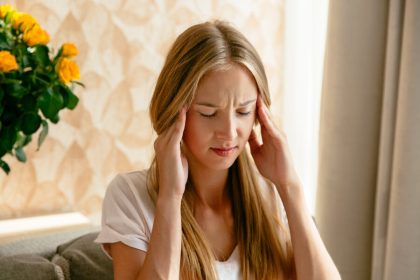Always feeling depressed from the headaches you feel throughout the day?
Headache – those unwelcome visitors that can put a damper on your day. They throb, they pulse, and sometimes they feel like a vice is squeezing your head. But before you reach for the medicine cabinet, there are natural remedies you can try for drug-free headache relief.
About 40% of people across the world have tension-type headaches and about 10% have migraine headaches.
What’s Behind the Ache?
Headache come in various forms, each with its own culprit. Here are some possible reasons for your throbbing head:
- Work Stress: Feeling overwhelmed at work can trigger tension headaches, the most common type. Muscle tension in the neck and scalp constricts blood vessels, leading to pain.
- Screen Time: Staring at computer screens for long periods can cause eye strain headaches. The blue light emitted by screens disrupts sleep patterns and can contribute to headaches.
- Dehydration: When you’re dehydrated, your brain tissue shrinks slightly, pulling on pain-sensitive nerves and causing a headache.
- Lack of Sleep: Not getting enough quality sleep can disrupt your body’s natural rhythm and lead to headaches.
- Certain Foods: Some people experience headaches after consuming foods high in histamine, MSG, or nitrates.
Finding Relief at Home
The good news is there are natural remedies you can try to alleviate your headache without resorting to medication. Here are some useful methods for YOU:
- Hydration is Key: Dehydration is a frequent headache trigger. Start by drinking a large glass of water and aim to stay hydrated throughout the day.
- The Power of Cooling: Apply a cold compress to your forehead or neck. The coolness constricts blood vessels, reducing inflammation and pain. Wrap ice cubes in a thin towel or use a cold gel pack. Apply for 15-minute intervals with 15-minute breaks in between.
- Warmth Soothes: If your headache feels tight and achy, a warm compress can be a welcome relief. Use a heating pad on a low setting or soak a washcloth in warm water and apply it to your neck or forehead.
- Dim the Lights: Bright lights can exacerbate headaches, especially migraines. Dim the lights in your room or take a break in a darker environment.
- Relaxation Techniques: Tension headaches often respond well to relaxation techniques. Deep breathing exercises, progressive muscle relaxation, and meditation can all help to ease muscle tension and reduce headache pain.
Natural Remedies for an Extra Boost
Sometimes, a little extra help would be needed. Here are some natural remedies you might find effective:
- Ginger Tea for Relief: Ginger is a natural anti-inflammatory that can help reduce headache pain. Steep a few slices of fresh ginger in hot water for 10 minutes, strain, and enjoy this soothing tea.
- Magnesium Magic: Magnesium deficiency has been linked to headaches. Consider incorporating magnesium-rich foods like dark leafy greens, nuts, seeds, and whole grains into your diet. You can also try a magnesium supplement, but consult your doctor first.
- Acupressure for Tension: Acupressure involves applying pressure to specific points on your body. There’s evidence that acupressure may be helpful for relieving tension headaches. You can find acupressure tutorials online or consult a qualified practitioner.
Relaxation Techniques to Relieve Tension Headaches
Tension headaches often respond well to relaxation techniques. Here are a few methods to try:
- Deep Breathing: Focus on slow, deep breaths, inhaling through your nose for a count of four, holding for a count of four, and exhaling slowly through your mouth for a count of eight. Repeat this for several minutes.
- Progressive Muscle Relaxation: Tense and relax different muscle groups throughout your body, starting with your toes and working your way up to your head. Hold the tension for a few seconds, then release completely.
- Meditation: Find a quiet place, sit comfortably, and focus on your breath. Let go of distracting thoughts and simply observe your breath coming and going. Online or through applications, an abundance of guided meditations are accessible.
Remember:
Track Your Triggers: Keeping a headache diary can help you identify your triggers. This can help you avoid situations or foods that contribute to your headaches.
Listen to Your Body: If home remedies aren’t providing relief, consult your doctor. They can help determine the cause of your headaches and recommend appropriate treatment.
Conclusion
By incorporating these natural remedies and relaxation techniques into your routine, you can effectively manage your headaches and reclaim your day. Remember, a healthy lifestyle that includes proper hydration, regular exercise, and adequate sleep can go a long way in preventing headaches altogether. So, ditch the drugs, embrace natural solutions, and live a pain
FAQs
What are some common causes of headache?
Common causes of headaches include stress, dehydration, lack of sleep, eyestrain, and certain foods or drinks.
What are some effective home remedies for headache?
Effective home remedies for headache include staying hydrated, getting adequate rest, applying a cold compress to the forehead or neck, practicing relaxation techniques such as deep breathing or meditation, and massaging pressure points on the head and neck.
Can certain foods trigger headaches?
Yes, certain foods and drinks can trigger headaches in some individuals. Common triggers include alcohol, caffeine, chocolate, aged cheeses, processed meats, and foods containing MSG (monosodium glutamate).
Is it helpful to apply heat or cold to relieve headaches?
Both heat and cold therapy can be helpful in relieving headaches, depending on the type of headache and personal preference. Cold compresses can help reduce inflammation and numb pain, while heat therapy can help relax muscles and improve blood flow.
When should I seek medical attention for a headache?
You should seek medical attention for a headache if it is severe or persistent, accompanied by fever, nausea, vomiting, or neurological symptoms such as confusion, weakness, or vision changes.





